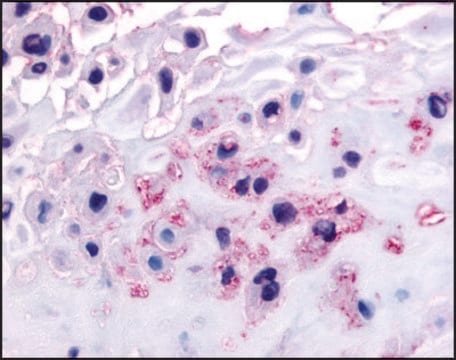SRP5020
DDR1 (444-end), active, GST tagged human
PRECISIO® Kinase, recombinant, expressed in baculovirus infected Sf9 cells, ≥70% (SDS-PAGE), buffered aqueous glycerol solution
Synonym(s):
CAK, CD167, DDR, EDDR1, MCK10, NEP, NTRK4, PTK3, PTK3A, RTK6, TRKE
Sign Into View Organizational & Contract Pricing
All Photos(2)
About This Item
UNSPSC Code:
12352200
NACRES:
NA.32
Recommended Products
General description
DDR1 is a member of the subfamily of tyrosine kinase receptors with a homology region to the Dictyostelium discoideum protein discoidin I in its extracellular domain. DDR1 is widely expressed in normal and transformed epithelial cells and is activated by various types of collagen. Expression of DDR1 is restricted to epithelial cells, particularly in the kidney, lung, gastrointestinal tract, and brain and DDR1 is over-expressed in fast-growing invasive tumors of the breast, ovary, esophagus, brain and lung. Collagen type I mediated stimulation of DDR1 leads to activation of matrix metalloproteinase 2 and 9 as well as increased cell invasion.
Physical form
Supplied in 50mM Tris-HCl, pH 7.5, 150mM NaCl, 10mM glutathione, 0.1mM EDTA, 0.25mM DTT, 0.1mM PMSF, 25% glycerol.
Preparation Note
after opening, aliquot into smaller quantities and store at -70 °C. Avoid repeating handling and multiple freeze/thaw cycles
Legal Information
PRECISIO is a registered trademark of Merck KGaA, Darmstadt, Germany
Storage Class Code
10 - Combustible liquids
WGK
WGK 1
Flash Point(F)
Not applicable
Flash Point(C)
Not applicable
Choose from one of the most recent versions:
Certificates of Analysis (COA)
Lot/Batch Number
Don't see the Right Version?
If you require a particular version, you can look up a specific certificate by the Lot or Batch number.
Already Own This Product?
Find documentation for the products that you have recently purchased in the Document Library.
Daizo Yoshida et al.
Cell adhesion & migration, 1(2), 92-98 (2007-04-01)
The aim of this study is to examine a novel drop culture model using a biologically inspired self-assembling peptide: hydrogel (RAD16-I, also called PuraMatrix), which produces a nanoscale environment similar to native extracellular matrix (ECM) for a cell line weakly
E Di Marco et al.
The Journal of biological chemistry, 268(32), 24290-24295 (1993-11-15)
We have identified and cloned a new member of the trk gene family, termed trkE, which generates a 3.9-kilobase (kb) transcript in normal human keratinocytes and in a variety of normal human tissues, but not in liver. Albeit at low
Our team of scientists has experience in all areas of research including Life Science, Material Science, Chemical Synthesis, Chromatography, Analytical and many others.
Contact Technical Service





